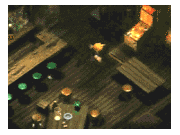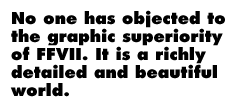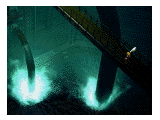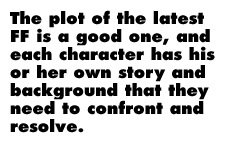"Final Fantasy VII" Marches Forward, Steps Back
GAME REVIEW By AMY PANG
Blast Los Angeles Bureau
I was a big enough geek to pre-order "Final Fantasy VII," myself being a fan of the
series ever since its first Nintendo cartridge game. And when I got it on a
Saturday afternoon, I was immediately taken with the epic scope of the
game. An absorbing and moving storyline, graphics that I've never seen on a
cartridge game, really cool spells - all the elements that I expected were
there.
 After finishing the game in a little more than a month (a remarkable accomplishment,
considering I have a full-time job and grad school, plus some semblance of
a social life), I can now look at it with a more critical eye.
After finishing the game in a little more than a month (a remarkable accomplishment,
considering I have a full-time job and grad school, plus some semblance of
a social life), I can now look at it with a more critical eye.
The story revolves around one Cloud Strife, a mercenary with a faulty
memory who at first works for a group of rebels intent on bringing down the
powerful Shinra, Inc., whose greed is draining the Planet of its life.
Eventually, the quest becomes the larger task of saving the Planet from
ultimate destruction.
 In a game in which the plot is so character-driven, it is important to have
sympathetic characters, or at least characters that you can feel connected
to. I had difficulties with Cloud because he really was not someone that
provoked my emotions until much later in the game. One of the annoyances of
FFVII is that for most of the game you're stuck with Cloud in your party.
Unlike Chrono in Chronotrigger, you can't cycle him out. Granted, much of
the game is a coming-to-terms for Cloud, who's confused about his past and
needs to reconcile his memories with reality. But he is, for lack of a
better term, a jerk.
In a game in which the plot is so character-driven, it is important to have
sympathetic characters, or at least characters that you can feel connected
to. I had difficulties with Cloud because he really was not someone that
provoked my emotions until much later in the game. One of the annoyances of
FFVII is that for most of the game you're stuck with Cloud in your party.
Unlike Chrono in Chronotrigger, you can't cycle him out. Granted, much of
the game is a coming-to-terms for Cloud, who's confused about his past and
needs to reconcile his memories with reality. But he is, for lack of a
better term, a jerk.
 The female characters are a little more fleshed out than the norm, although
Terra and Celes from FFIII are in my eyes still the most believable and
complex female characters of the American FF series. Tifa, Cloud's
childhood friend, is compassionate and strong, but around Cloud she loses
some of the power of her personality and seems more concerned with his
welfare than hers. Aeris is the pivotal character of the game - indeed, the
game would've taken a much more radical turn if Aeris didn't sacrifice
herself for the sake of the Planet. Her inherent strength is tempered by
her so-called crush on Cloud and her subsequent girlish behavior. What on
earth did she see in him? Yuffie, the teenage ninja girl, is brash, devious
and gutsy. Her loyalty is to the memory of the greatness of her hometown,
which she wishes to bring back to glory. This puts her at odds with the
objectives of the rest of the party, as evidenced by not one, but two
betrayals. But she too is nothing more than a cartoon - after her
sub-quest, it's all over.
The female characters are a little more fleshed out than the norm, although
Terra and Celes from FFIII are in my eyes still the most believable and
complex female characters of the American FF series. Tifa, Cloud's
childhood friend, is compassionate and strong, but around Cloud she loses
some of the power of her personality and seems more concerned with his
welfare than hers. Aeris is the pivotal character of the game - indeed, the
game would've taken a much more radical turn if Aeris didn't sacrifice
herself for the sake of the Planet. Her inherent strength is tempered by
her so-called crush on Cloud and her subsequent girlish behavior. What on
earth did she see in him? Yuffie, the teenage ninja girl, is brash, devious
and gutsy. Her loyalty is to the memory of the greatness of her hometown,
which she wishes to bring back to glory. This puts her at odds with the
objectives of the rest of the party, as evidenced by not one, but two
betrayals. But she too is nothing more than a cartoon - after her
sub-quest, it's all over.
In the American FF series, the female members allowed in your party have
gone through a minor evolution. The first of them appeared in FFII (as all
the party members in the very first FF were male, although the White and
Black Wizards may have possibly been female. Who could tell under all those
robes?) but were not stellar examples of strong women. Rosa, the White
Wizard and the hero's paramour, seemed to say nothing but "Oh, Cecil!" and
is little more than the hero's love interest. Rydia was a little spunkier,
but as an adult she didn't have much depth.
 In contrast, the female characters in FFIII - Terra, Celes, and Relm - were
much more complex. The half-human, half-Esper Terra discovers her lineage
in the middle of the game, goes crazy, recovers, then searches for the
meaning of love, which she finds in taking care of a group of orphaned
children. Celes, who was created as a fighting machine, becomes more human
during the course of the game. Relm is a child who's much smarter than her
years would warrant; she spends most of her on-screen time harassing her
adoptive grandfather. It was also positive that Terra and Celes were pretty
handy with a sword and could do some damage. Of course, the male characters
did more physical damage, but it's better that the piddling amount of hurt
Rosa or Rydia could inflict, no matter what you equipped them with. In
essence, all the FFIII characters, although they had flaws, had histories -
you cared about them and wanted them to succeed in their mission to save
the world from evil.
In contrast, the female characters in FFIII - Terra, Celes, and Relm - were
much more complex. The half-human, half-Esper Terra discovers her lineage
in the middle of the game, goes crazy, recovers, then searches for the
meaning of love, which she finds in taking care of a group of orphaned
children. Celes, who was created as a fighting machine, becomes more human
during the course of the game. Relm is a child who's much smarter than her
years would warrant; she spends most of her on-screen time harassing her
adoptive grandfather. It was also positive that Terra and Celes were pretty
handy with a sword and could do some damage. Of course, the male characters
did more physical damage, but it's better that the piddling amount of hurt
Rosa or Rydia could inflict, no matter what you equipped them with. In
essence, all the FFIII characters, although they had flaws, had histories -
you cared about them and wanted them to succeed in their mission to save
the world from evil.
I don't want to censure the portrayals of Tifa, Aeris and Yuffie, because
despite their limitations, they are still reasonably well done. However, I
don't think it would have been that difficult to give them better dialogue.
Another character whose portrayal made me feel uncomfortable is Barret. He
looks like Mr. T and unfortunately his personality is akin to B.A. Baracus'
on "The A-Team." I would hesitate to call it a racist portrayal, but why
couldn't Barret be, you know, just another guy? Why does he have to talk
like he grew up on the street?
 No one has objected to the graphic superiority of FFVII. It is a richly
detailed and beautiful world. One gets the sense that Midgar, although a
destination that villagers in outlying areas dream about, is nothing more
than a slum created by technology. Even battle scenes, the most tedious
parts of any RPG, have been shot with cinematic effect, using
different angles.
No one has objected to the graphic superiority of FFVII. It is a richly
detailed and beautiful world. One gets the sense that Midgar, although a
destination that villagers in outlying areas dream about, is nothing more
than a slum created by technology. Even battle scenes, the most tedious
parts of any RPG, have been shot with cinematic effect, using
different angles.
But with the advancement of the visual aspects of a game, can't the
storyline and characters be enhanced as well? Going back to FFIII, I found
the characters there much more compelling than those in FFVII.
 I have read an argument that the fate of the individuals in FFVII didn't
matter because the game was really about the larger issue of saving the
Planet - the characters you control just happen to be involved. I agree
with this assessment, yet that doesn't mean that the characters should be
diminished in terms of gameplay. You're stuck with them after all.
I have read an argument that the fate of the individuals in FFVII didn't
matter because the game was really about the larger issue of saving the
Planet - the characters you control just happen to be involved. I agree
with this assessment, yet that doesn't mean that the characters should be
diminished in terms of gameplay. You're stuck with them after all.
 The plot of the latest FF is a good one, and each character has his or her
own story and background that they need to confront and resolve. However,
it is the strange mix of personalities, and that they seem too
one-dimensional in comparison to the plot, that make it difficult to have
an emotional attachment to any one of them. The translation is also
sloppily done. "Of course!" is mangled as "Off, course!" Grammatical errors
such as that shouldn't have slipped through the cracks, but they did.
The plot of the latest FF is a good one, and each character has his or her
own story and background that they need to confront and resolve. However,
it is the strange mix of personalities, and that they seem too
one-dimensional in comparison to the plot, that make it difficult to have
an emotional attachment to any one of them. The translation is also
sloppily done. "Of course!" is mangled as "Off, course!" Grammatical errors
such as that shouldn't have slipped through the cracks, but they did.
In playing a video game, the player is making an agreement to enter its
world and its reality without comment. To quibble over minor details like
those above are the obsessions of a fanatic, perhaps. But since this is
being touted as one of the most cinematic, intricate and complex video game to
date, the player is entitled to as much perfection as possible.